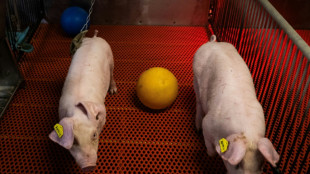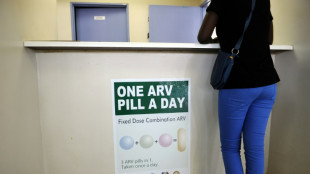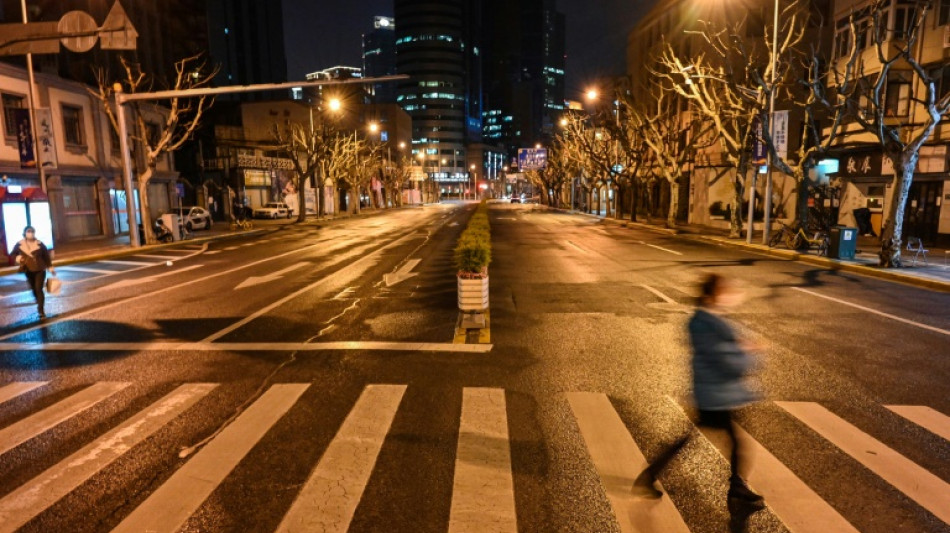
-
 Australia fear rank turner for second Sri Lanka Test
Australia fear rank turner for second Sri Lanka Test
-
EU seeks new import fee on e-commerce packages

-
 Oscars frontrunner 'Emilia Perez' suffers awards season crash
Oscars frontrunner 'Emilia Perez' suffers awards season crash
-
Swedish police say school killing spree gunman likely shot himself

-
 Stocks, dollar drop as tariff tensions intensify
Stocks, dollar drop as tariff tensions intensify
-
Oil giants TotalEnergies, Equinor reduce low-carbon investments

-
 Kremlin calls Zelensky's readiness for Putin talks 'empty words'
Kremlin calls Zelensky's readiness for Putin talks 'empty words'
-
Trump bid to take over Gaza, move Palestinians faces backlash

-
 Liverpool's Slot not a fan of in-stadium VAR announcements
Liverpool's Slot not a fan of in-stadium VAR announcements
-
Stiff competition awaits as Vonn hunts gold in world super-G

-
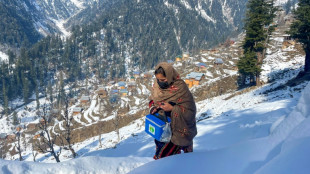 Pakistan health workers kick off polio drive despite snow
Pakistan health workers kick off polio drive despite snow
-
Austria's Puchner tops second downhill training at world champs

-
 Bid to sell Suu Kyi's Myanmar mansion flops for third time
Bid to sell Suu Kyi's Myanmar mansion flops for third time
-
Aga Khan: racehorse billionaire and Islamic spiritual leader

-
 China slams US 'suppression' as trade war deepens
China slams US 'suppression' as trade war deepens
-
Sri Lanka's Karunaratne to bow out of Tests after 'fulfilling dream'

-
 Philippine House votes to impeach VP Sara Duterte
Philippine House votes to impeach VP Sara Duterte
-
Tokyo police bust alleged prostitution ring targeting tourists

-
 Baltics to cut Soviet-era ties to Russian power grid
Baltics to cut Soviet-era ties to Russian power grid
-
Iraq's famed 'hunchback' of Mosul rebuilt brick by brick

-
 Stock markets stutter as traders weigh China-US trade flare-up
Stock markets stutter as traders weigh China-US trade flare-up
-
Hamas rejects Trump proposal to take over Gaza, move Palestinians

-
 MotoGP champion Martin taken to hospital after Malaysia crash
MotoGP champion Martin taken to hospital after Malaysia crash
-
YouTubers causing monkeys to attack tourists at Cambodia's Angkor Wat
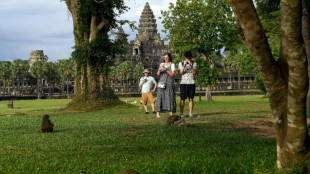
-
 Sweden reels from worst mass shooting in its history
Sweden reels from worst mass shooting in its history
-
India's Modi takes ritual dip at Hindu mega-festival

-
 Nissan shares fall as reports say Honda merger talks off
Nissan shares fall as reports say Honda merger talks off
-
US Postal Service says suspending parcels from China

-
 Toyota announces Lexus EV plant in Shanghai
Toyota announces Lexus EV plant in Shanghai
-
Santander reports record profit for third straight year

-
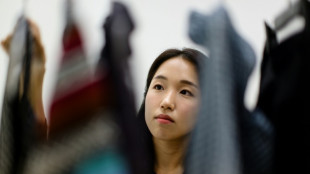 No new clothes: S. Korean climate activist targets hyperconsumption
No new clothes: S. Korean climate activist targets hyperconsumption
-
Cummins 'hugely unlikely' for Australia's Champions Trophy bid

-
 Nissan shares plunge as report says Honda merger talks off
Nissan shares plunge as report says Honda merger talks off
-
China holds out hope last-minute deal can avert US trade war

-
 LeBron relishing 'special' Doncic double act
LeBron relishing 'special' Doncic double act
-
Tatum shines as Celtics down Cavs, Lakers thrash Clippers

-
 Myanmar junta bid to sell Suu Kyi mansion flops for third time
Myanmar junta bid to sell Suu Kyi mansion flops for third time
-
Australia bans DeepSeek AI program on government devices

-
 Olympics on horizon as China hosts Asian Winter Games
Olympics on horizon as China hosts Asian Winter Games
-
Tatum, White shine as Celtics down Cavs

-
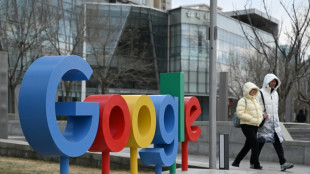 Google pledge against using AI for weapons vanishes
Google pledge against using AI for weapons vanishes
-
African football has the platform for historic World Cup success

-
 France prop Gros happy to go 'under radar' for Dupont's benefit
France prop Gros happy to go 'under radar' for Dupont's benefit
-
Bove's future uncertain after heart attack horror as Fiorentina finish Inter clash

-
 Race against time to complete contested Milan-Cortina bobsleigh track
Race against time to complete contested Milan-Cortina bobsleigh track
-
Speed queen Goggia pursuing Olympic dreams with 2026 Winter Games on horizon

-
 Asian markets stutter as traders weigh China-US trade flare-up
Asian markets stutter as traders weigh China-US trade flare-up
-
French PM set to survive no confidence vote

-
 Trump says US will take over Gaza, create 'Riviera of the Middle East'
Trump says US will take over Gaza, create 'Riviera of the Middle East'
-
Google shares slide on spending plans despite sales jump


Is this the end of the zero-Covid strategy?
Jenny Leung, who lost her job as a waitress last month due to Hong Kong's zero-Covid strategy, has one question: "What was it all for?"
Her frustration was in response to Hong Kong indicating it could transition towards living with the virus, though the city's leaders have since said it will stick with zero-Covid.
Leung, 29, called it a "half-hearted attempt" after more than two years of "a zero-Covid mindset that really hurt all of us".
China finds itself increasingly isolated in pursuing the strategy, which uses harsh localised lockdowns to snuff out even a small number of infections, after other early adopters such as Australia and New Zealand abandoned it last year.
A new daily record number of Covid cases in China on Wednesday of more than 20,000 piled further pressure on Beijing's zero-Covid strategy as millions remain locked down in financial centre Shanghai.
Although Hong Kong now insists it will stick with its zero-Covid policy despite easing some restrictions, experts suggest that the strategy's days could be numbered.
Such policies saved lives by fending off worse outbreaks in the early stages of the pandemic, but the availability of vaccines -- and the emergence of the more contagious but less severe Omicron variant -- have since changed the equation.
"The extent you need to go to block transmission is so high and the added gain you have for health becomes much, much smaller," Sharon Lewin, director of the Peter Doherty Institute for Infection and Immunity at the University of Melbourne, told AFP.
But the risk-benefit ratio may be different for China and Hong Kong, where vaccination rates have been falling behind, particularly among the vulnerable elderly.
China revealed last month that only around half of its population over 80 years old had been fully vaccinated.
- Vaccination struggles -
And since Omicron arrived in December, the vast majority of Hong Kong's around 8,000 deaths have been elderly, unvaccinated people.
Andrew Lee, professor of public health at the University of Sheffield, warned that if vaccination coverage is "inadequate, as was the case in Hong Kong, loosening (China's) zero-Covid policy could lead to a lot of deaths".
He said another problem was that China uses the homegrown Sinovac and Sinopharm vaccines, "both of which are not nearly as efficacious as the Pfizer, Moderna vaccines used in the West".
Ben Cowling, professor of epidemiology at the University of Hong Kong, said his research had shown that vaccine hesitancy increased in Hong Kong among over 65s last year.
One of the most common reasons for hesitancy was "doubt over the benefits of vaccination, particularly in the context of a zero-Covid strategy," he told AFP.
This was a problem faced by other countries that pursued the strategy: how do you convince a population to get vaccinated against a disease when there are zero cases nearby?
Lewin said Australia's vaccination campaign only really "took off" once the Delta variant arrived in June 2021. "You have to have some Covid for vaccination uptake to be really high."
Australia only lifted its strict measures late last year when around 80 percent of the population had received two vaccine doses.
That kind of carrot -- the end of zero-Covid measures if vaccination targets are met -- has not been offered by China or Hong Kong.
Anant Deboor, a Hong Konger who works in strategic marketing, spent time in Portugal last year and marvelled at how the country communicated about moving towards living with the virus.
- What about next time? -
"We have had a bureaucratic, rules-obsessed leadership with a lack of foresight and amateurish communication loaded with threats and prosecution," he told AFP.
Another disadvantage for zero-Covid strategies is a lack of natural immunity, which is gained by people recovering from the virus.
Lewin pointed to South Africa, where only 35 percent of the population is vaccinated -- but she said prior infections could be as high as 80 percent.
However, that level of natural immunity comes with a price: South Africa has recorded more than 100,000 deaths compared to 13,600 in China despite having a fraction of its population.
Looking forward to the next potential pandemic, Cowling said we would likely "revisit the possibility of attempting temporary containment of a new pathogen" until vaccines become available.
Lewin said that locking down quickly would be critical in such a situation, but that relied on "the free exchange of information" from the country where the new threat emerges.
It is also vital that countries significantly invest in public health systems, something that has still not happened in many hard-hit countries like the United States, she said.
Lee simply warned not to get too complacent -- a new, more severe Covid variant is still "a very real possibility".
H.Seidel--BTB

